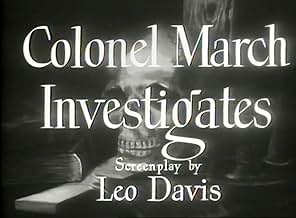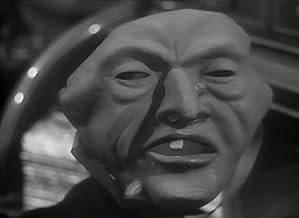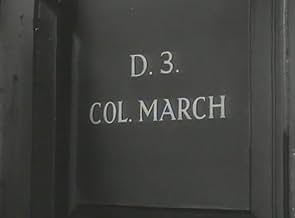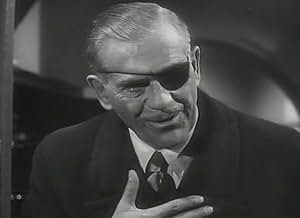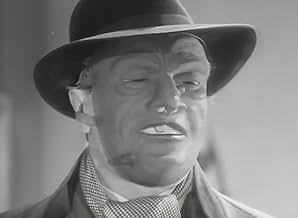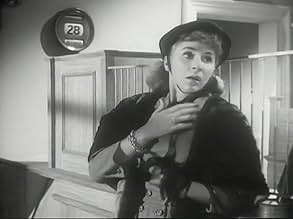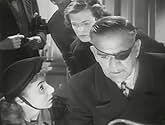Füge eine Handlung in deiner Sprache hinzuThree episodes of "Colonel March of Scotland Yard" edited together for theatrical release.Three episodes of "Colonel March of Scotland Yard" edited together for theatrical release.Three episodes of "Colonel March of Scotland Yard" edited together for theatrical release.
- Regie
- Drehbuch
- Hauptbesetzung
Patricia Owens
- Betty Hartley
- (Archivfilmmaterial)
Dana Wynter
- Francine Rapport
- (as Dagmar Wynter)
Peter Butterworth
- Bank clerk
- (Nicht genannt)
Cy Endfield
- Man leaving British Museum library
- (Nicht genannt)
Pat Hagan
- Police Constable at Bank
- (Nicht genannt)
Victor Harrington
- Customer in Bank
- (Nicht genannt)
Empfohlene Bewertungen
Colonel March investigates three cases, the first a bank robbery, in which a mask wearing gunman gets away with a haul of cash, killing someone in the process.
In the second case, March is at night club where a Javanese dancer killed, and in the third March deals with a man who's convinced he's witnessed a murder through his binoculars.
Boris Karloff is great as Colonel March, an eye patch wearing, straight talking Detective, who often talks directly to the camera.
March establishes exactly what happens as 'The Department for Queer complaints,' he deals with some of the more unusual crimes, locked room mysteries as it were.
Some years ago, I worked my way through Thr Colonel March series, and for its time, I always felt it was somewhat ahead of its time, it really has that feeling of a 1950's American TV series, but of course it's set in The UK, with a largely British cast.
The three cases flow fairly well together, it doesn't feel cobbled together at any point. If you can access the TV series, I'd recommend it, as a few of the cases are very interesting.
Watch out for several well known faces, you'll see Ronald Leigh Hunt, Joan Sims, Richard Wattis, Sheila Burrell and more.
It's definitely worth a look.
7/10.
In the second case, March is at night club where a Javanese dancer killed, and in the third March deals with a man who's convinced he's witnessed a murder through his binoculars.
Boris Karloff is great as Colonel March, an eye patch wearing, straight talking Detective, who often talks directly to the camera.
March establishes exactly what happens as 'The Department for Queer complaints,' he deals with some of the more unusual crimes, locked room mysteries as it were.
Some years ago, I worked my way through Thr Colonel March series, and for its time, I always felt it was somewhat ahead of its time, it really has that feeling of a 1950's American TV series, but of course it's set in The UK, with a largely British cast.
The three cases flow fairly well together, it doesn't feel cobbled together at any point. If you can access the TV series, I'd recommend it, as a few of the cases are very interesting.
Watch out for several well known faces, you'll see Ronald Leigh Hunt, Joan Sims, Richard Wattis, Sheila Burrell and more.
It's definitely worth a look.
7/10.
Boris Karloff heads a secret Scotland Yard dept (the Department of Queer Complaints - don't think they'd call it that today), which investigates mysteries - always crime, sometimes seemingly supernatural (a little like an early forerunner of Jonathan Creek). This movie contains three stories, edited together from the first three episodes of the Colonel March of Scotland Yard 1952 UK TV series, for a theatrical release; 'Hot Money', 'Death in the Dressing Room', and 'The New Invisible Man'. Nice to spot the old TV faces, Karloff is fun to watch as always, and the solutions are pretty clever. 6.5/10.
Blacklisted Hollywood director Cy Endfield was given sanctuary at Nettlefold Studos in the early fifties by producer Hannah Weinstein directing these three pilot episodes for a TV series cobbled together into a rather hectic feature film starring a dashing-looking Boris Karloff sporting an eyepatch as he stumbled across a succession of bizarre crimes as John Dickson Carr's Colonel March of Scotland Yard.
(Years later, two of the cast, John Hewer and Sheila Burrell, became famous in add campaigns; John Hewer (now bearded) as Captain Birdseye and Sheila Burrell as the little old lady dismayed to discover her local bank is now "a trendy wine bar".)
(Years later, two of the cast, John Hewer and Sheila Burrell, became famous in add campaigns; John Hewer (now bearded) as Captain Birdseye and Sheila Burrell as the little old lady dismayed to discover her local bank is now "a trendy wine bar".)
American-financed but shot in London, COLONEL MARCH OF Scotland YARD was a short-lived 1950s-era TV series starring Boris Karloff as a detective in charge of Department 3 at Scotland Yard - a department commonly nicknamed 'The Department of Queer Complaints'. It's a period-era X-FILES, with Karloff investigating various supernaturally-tinged crimes.
This film version is an anthology of three episodes from the show, all of them featuring a typically imposing Karloff as the eyepatch-sporting hero. It's always great to see the genial Karloff playing the hero for a change, and his gruff charm adds immeasurably to the pleasure of this otherwise rather ordinary little anthology. My main disappointment with COLONEL MARCH INVESTIGATES is that the supernatural stuff is kept distinctly limited in favour of the more ordinary explanation.
The first story, HOT MONEY, is about a bank robbery in which the loot vanishes; it's short and snappy, and worth seeing for Joan Sims, impossibly young and playing a lawyer's secretary. The second story, DEATH IN THE DRESSING ROOM, has some fun in the form of exotic dance and the atmospheric nightclub scenes, and features the lovely Dana Wynter alongside an on-form Richard Wattis, cast against type. The third story, THE NEW INVISIBLE MAN, sounds great but is in fact the least, a simple tale with a simple twist. Still, these are great fun for the era, and it's worth seeing for Karloff alone.
This film version is an anthology of three episodes from the show, all of them featuring a typically imposing Karloff as the eyepatch-sporting hero. It's always great to see the genial Karloff playing the hero for a change, and his gruff charm adds immeasurably to the pleasure of this otherwise rather ordinary little anthology. My main disappointment with COLONEL MARCH INVESTIGATES is that the supernatural stuff is kept distinctly limited in favour of the more ordinary explanation.
The first story, HOT MONEY, is about a bank robbery in which the loot vanishes; it's short and snappy, and worth seeing for Joan Sims, impossibly young and playing a lawyer's secretary. The second story, DEATH IN THE DRESSING ROOM, has some fun in the form of exotic dance and the atmospheric nightclub scenes, and features the lovely Dana Wynter alongside an on-form Richard Wattis, cast against type. The third story, THE NEW INVISIBLE MAN, sounds great but is in fact the least, a simple tale with a simple twist. Still, these are great fun for the era, and it's worth seeing for Karloff alone.
It's really too bad about the print quality because COLONEL MARCH INVESTIGATES allows us the opportunity to watch BK thoroughly enjoying himself portraying the one-eyed Scotland Yard detective who heads up the one-man "Department Of Queer Complaints" (this name certainly wouldn't fly today). The overall tone is lightly humorous even though 3 murders occur, one in each of the three stories depicted. Contrary to what is generally believed, INVESTIGATES is not part of the COLONEL MARCH TV series. INVESTIGATES was shot in 1952 as the pilot episode for the TV series which would be made later.
The three segments were taken from a series of stories by John Dickson Carr (1906-1977), an American writer of detective fiction who lived in England for a number of years and used a number of aliases. The Colonel March stories were written under the name Carter Dickson. The three stories were adapted by blacklisted American writers Walter Bernstein and Abraham Polonsky who did not receive screen credit. The director was Donald Ginsberg but, surprisingly, the direction is credited to Cy Endfield of ZULU fame, another blacklisted American artist.
The film opens with Colonel March introducing himself and showing us a cabinet containing a collection of curios. The first one is a grotesque rubber mask. A masked thief robs a bank and kills a guard. A cashier tracks him to a lawyer's office but the thief and the money have disappeared. Next out of the cabinet are a Javanese dagger and a ticket telling the story of a murdered Javanese dancer. Finally a nosy neighbor witnesses disembodied gloves commit a murder. Inspector Ames of Scotland Yard (Ewan Roberts) investigates all three incidents without success, so it's left to March to figure things out.
The Carr stories used are HOT MONEY, MURDER IN THE DRESSING ROOM, and THE NEW INVISIBLE MAN. Joining Karloff and Ewan Roberts are several dependable British performers including Richard Wattis, Sheila Burrell, Joan Sims, and Ronald Leigh-Hunt. The production values are minimal but if a quality print had been used, they would look better than they do. The same holds true for the audio. It's of variable quality but isn't that hard to follow. Karloff's voice, not surprisingly, comes off best. The background music is by conductor and arranger John Lanchberry. Episodes of the later TV series can be found online but their print quality is even worse.
The three segments were taken from a series of stories by John Dickson Carr (1906-1977), an American writer of detective fiction who lived in England for a number of years and used a number of aliases. The Colonel March stories were written under the name Carter Dickson. The three stories were adapted by blacklisted American writers Walter Bernstein and Abraham Polonsky who did not receive screen credit. The director was Donald Ginsberg but, surprisingly, the direction is credited to Cy Endfield of ZULU fame, another blacklisted American artist.
The film opens with Colonel March introducing himself and showing us a cabinet containing a collection of curios. The first one is a grotesque rubber mask. A masked thief robs a bank and kills a guard. A cashier tracks him to a lawyer's office but the thief and the money have disappeared. Next out of the cabinet are a Javanese dagger and a ticket telling the story of a murdered Javanese dancer. Finally a nosy neighbor witnesses disembodied gloves commit a murder. Inspector Ames of Scotland Yard (Ewan Roberts) investigates all three incidents without success, so it's left to March to figure things out.
The Carr stories used are HOT MONEY, MURDER IN THE DRESSING ROOM, and THE NEW INVISIBLE MAN. Joining Karloff and Ewan Roberts are several dependable British performers including Richard Wattis, Sheila Burrell, Joan Sims, and Ronald Leigh-Hunt. The production values are minimal but if a quality print had been used, they would look better than they do. The same holds true for the audio. It's of variable quality but isn't that hard to follow. Karloff's voice, not surprisingly, comes off best. The background music is by conductor and arranger John Lanchberry. Episodes of the later TV series can be found online but their print quality is even worse.
Wusstest du schon
- WissenswertesA pilot comprising three stories which would become episodes of the TV series 'Colonel March of Scotland Yard', filmed in the Autumn of 1952 at Nettlefold Studios: "Hot Money (1956)," "Death in the Dressing Room (1956)," and "The New Invisible Man (1956)."
- PatzerIn the final segment, 'The New Invisible Man', Major Rodman is kept in the police station. It is not clear who, therefore, has lit the fire in his sitting room, and kept it blazing all day.
- Zitate
Insp. Ames: The radiator! Now why didn't I think of that?
Col. March: My dear Ames. Please don't embarrass us both by forcing me to answer that question.
- Crazy CreditsOpening credits prologue: LONDON
- VerbindungenEdited from Colonel March of Scotland Yard (1954)
Top-Auswahl
Melde dich zum Bewerten an und greife auf die Watchlist für personalisierte Empfehlungen zu.
Details
- Erscheinungsdatum
- Herkunftsland
- Sprache
- Auch bekannt als
- The Department of Queer Complaints
- Drehorte
- 140 Kings Road, Chelsea, London, England, Vereinigtes Königreich(exterior Barclays Bank)
- Produktionsfirma
- Weitere beteiligte Unternehmen bei IMDbPro anzeigen
- Laufzeit1 Stunde 10 Minuten
- Farbe
- Seitenverhältnis
- 1.37 : 1
Zu dieser Seite beitragen
Bearbeitung vorschlagen oder fehlenden Inhalt hinzufügen

Oberste Lücke
By what name was Colonel March Investigates (1953) officially released in Canada in English?
Antwort
